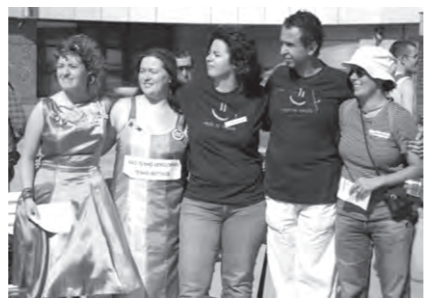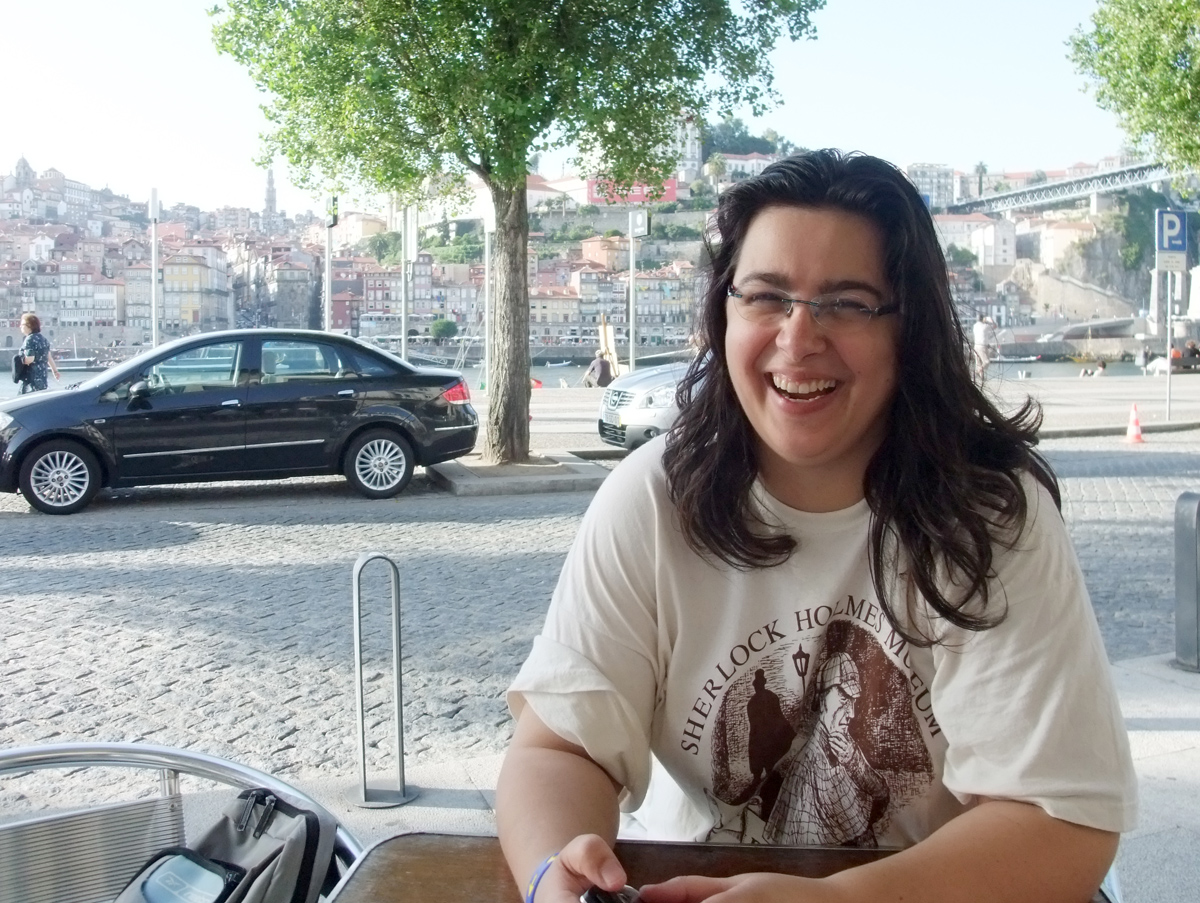By Robyn Ochs
From July 16 through August 4, 2009, I did a European book tour to promote the new second edition of Getting Bi. In Oporto, Portugal, I was warmly welcomed into the home of Paula Antunes, Sofia Fonseca and their daughter Mariana. Of the first three Portuguese bi activists I had met, two were named “Paula.” This led me to wonder for a moment: are all bi activists in Portugal named “Paula”? The answer is obviously, “no.” But Paula Valenca, who has an essay in Getting Bi, and Paula Antunes, interviewed below, are the most prominent bi activists in Portugal. Here is an interview with Paula Antunes:
Robyn Ochs: Paula, please tell us about yourself.
Paula Antunes: I was born 33 years ago in a small town in Portugal. I love my country, bikes, reading and could spend all day long getting to know someone or something new.
RO: How did you come to identify as bi? How old were you? Who did you tell?
PA: My coming out happened quite late. I was 20 when I realized that women attracted me. For some time – a couple of years – I identified myself as a lesbian, before I realized that I was actually a bisexual woman. That was quite hard because – and I have to admit this – I had problems with the idea of not being straight or gay. At the time, the idea of being “in between” was really difficult. Over time I ended up realizing that bisexuality is a sexual orientation as valid as any other. Talking with my best friends helped me in deal with this question, as their reaction was actually better than mine. (smiles)
RO: What is your religious background, and what impact did this have on your coming out? Did it make it harder or easier? In what ways?
PA: I studied twelve years in catechesis in order to become a catechist. I sang in the church and I was responsible for one of the groups in MCE (Catholic Student’s Movement) – a large organization of Catholic youth, so, yes I have to say that I had a religious background. Strangely enough this did not have a negative effect on my coming out. Maybe because at MCE we had Christ’s philosophy, “love one another, no matter what,” and that was much stronger than the church’s point of view on homosexuality.
RO: You are a key activist in Portugal’s LGBT movement. How did you become an activist? How did you first get involved in activism?
PA: My parents always told me, since I was five or six years old, that I was an activist. Apparently I fought racism and sexism since I was little, so growing up it was natural for me to continue to fight and change what is wrong in causes in which I believe. Homophobia is just one more wrong in my path. About 10 years ago, shortly after the first LGBT organizations appeared in Portugal, I started working with them, and I still do. (smiles)
RO: Are there bi organizations in Portugal?
PA: There is currently only one Bi organization in Portugal, which is PontoBi, with a website at www.pontobi.org. It started about four years ago in Braga and Oporto, with monthly meetings. It took a while for people to show up. Today Braga’s group is “on pause” and Oporto meetings have usually 10-15 persons.
RO: You have been an activist for several years. What motivates you to stay involved?
PA: Simple. I cannot stand being part of a society that is not fair and do nothing about it. I believe that every citizen has not only the right, but also the duty to fight for a better world. When I was young, I had no chance of being fully me, since my sexual orientation was “taboo.” This is something I do not want my daughter – or your children – to have to endure.
RO: As a bi woman, do you feel fully accepted by your fellow activists?
PA: Most of the time, yes. But there is clearly biphobia even amongst activists, and – I hate to have to say this – mostly homosexual ones. I don’t quite understand why, but bisexuality is not yet well understood. The Portuguese LGBT movement is small, and bisexuals are an integral part of the movement, but as a bi activist, I have to say that there is much room for improvement.
RO: Why are you and Sofia being such wonderful, amazing, fabulous, excellent hosts to me as I sit here in your living room?
PA: (laughs) That’s just you being nice to me. But, I have to agree with you about Sofia. She is clearly an excellent host.

RO: What good things do you have to say about Sofia?
PA: She was my wife, and I love her deeply. We are no longer a couple, and our love is no longer romantic love, but nonetheless we share a home and a deep, strong, lifelong love. Just don’t let her know this. (smiles)
RO: I will be sure to send her a copy of this interview! Do you have contacts with bi and/or LGT activists in other countries? Does your knowledge of or contacts with bi or LGBT activism in other countries influence your activism here?
PA: Some contacts, yes. From UK, France, USA and mostly Galicia, Spain [the region of Spain closest to Oporto]. It has influenced my activism here because every time I have the chance to get to know someone new, or share information with the ones I already know, I learn something new that can be used in Portuguese LGBT activism, and vice-versa. This is of course a huge advantage.

